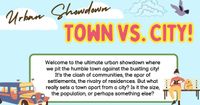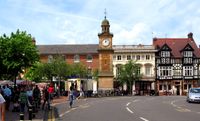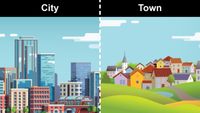Explore web search results related to this domain and discover relevant information.

A town is generally a populated area that is smaller than a city but larger than a village. It has a defined space, sometimes with its local government. The size criteria for what qualifies as a town can vary greatly from country to country.
A city is typically a large or important town. It usually has a more developed infrastructure, facilities, and services. Cities often serve as economic and cultural hubs within a region or country. The distinction between a city and a town can depend on legal or historical context and the criteria differ globally.Some places might consider the presence of certain municipal institutions or a minimum population for a settlement to be termed a city, which is not necessarily uniform across the world. When we talk about “town” and “city,” we’re referring to two types of human settlements that vary mainly in size and governance structure.Towns may offer local services and amenities, but they tend to have a smaller population and fewer facilities compared to cities. ... Stratford-upon-Avon, UK is famous for being the birthplace of William Shakespeare.New York City, USA, is a global financial, cultural and entertainment hub. Tokyo, Japan, stands as one of the world’s most populous metropolitan areas. When we talk about the distinctions between a city and a town, it’s easy to get tangled up in exceptions and regional variations.

No dia 6 de setembro, começa a segunda edição do evento The Town, festival de música realizado no Autódromo de Interlagos, em São Paulo. Serão cinco dias de shows — 6, 7, 12, 13 e 14 de setembro — com atrações como Green Day, Travis Scott e Katy Perry.
Para a prefeitura, festivais como The Town, Lollapalooza e Primavera Sound já se consolidaram como importantes impulsionadores da economia paulistana.Durante o The Town, o transporte público terá operação especial para facilitar a ida e volta do público.
... a densely populated urban area, typically smaller than a city and larger than a village, having some local powers of government and a fixed boundary ... the permanent residents of a university town as opposed to the university staff and students Compare gown (sense 3)
It had the advantages of town and country combined. regional note: in AM, usually use the city ... It seems that your browser is blocking this video content.It seems that your browser is blocking this video content. To access it, add this site to the exceptions or modify your security settings, then refresh this page. ... a densely populated urban area, typically smaller than a city and larger than a village, having some local powers of government and a fixed boundary ... the permanent residents of a university town as opposed to the university staff and students Compare gown (sense 3)A town is a place with many streets and buildings, where people live and work. Towns are larger than villages and smaller than cities.Wall Street Journal (2023)Work at the site in a southern town there is already underway.

It’s The Rawn Side of Town! And this song is called What I’m Looking For #newmusic #therawnsideoftown #sherylcrow #soakupthesun #summervibes #pov...
It’s The Rawn Side of Town! And this song is called What I’m Looking For #newmusic #therawnsideoftown #sherylcrow #soakupthesun #summervibes #pov #countrymusic #americana Link in bioat the top of her game 🔥Kelsey Mitchell is the new franchise leader in PPG in a single season (20.2) passing Tamika Catchings.MVP Mitchell.


The classification is intended to assist in analysing data, and understanding differences, trends and inequalities across Great Britain. Each constituency and local authority is assigned to one of six categories, e.g. “Core City” or “Small Town”, which most closely matches its population ...
The classification is intended to assist in analysing data, and understanding differences, trends and inequalities across Great Britain. Each constituency and local authority is assigned to one of six categories, e.g. “Core City” or “Small Town”, which most closely matches its population distribution.Classifying areas according to whether they are urban or rural is a familiar concept. Recently, however, interest has grown in the varying fortunes of different-sized settlements – for example, whether cities have fared better than towns since the financial crisis.Since there was no existing classification of constituencies & local authorities in terms of cities and towns, we set out to fill the gap. This classification provides an alternative way to analyse information for constituencies and local authorities. It is not intended as a replacement for other classifications: for many datasets, differences between urban and rural areas are the right thing to capture.Luton, on the other hand, doesn’t have city status, but is classified here as an ‘Other City’ because its population is 225,000. The precise division between ‘large’, ‘medium’ and ‘small’ towns is, to a large extent, subjective.
a compactly settled area usually larger than a village but smaller than a city; a compactly settled area as distinguished from surrounding rural territory; a large densely populated urban area : city… See the full definition
the town of Jackson, Florida The nearest shopping mall is two towns away. The town plans to increase property taxes.a compactly settled area usually larger than a village but smaller than a city; a compactly settled area as distinguished from surrounding rural territory; a large densely populated urban area : city… See the full definitiona compactly settled area usually larger than a village but smaller than a city… See the full definitionWe're heading to town later on.

A city is a larger and more important regional center than a town, but what we consider to be “large and important” may be subjective. If an urban center
The nouns town and city are used in some common expressions. You cannot typically use the two words interchangeably in these phrases. Sorry, your browser doesn't support embedded videos ... A city is a large and important “town.” The local laws and traditions in a particular country, state, or province determine the official status of an urban center as either a “town” or city.A city will usually have a relatively well-developed infrastructure and will therefore have a greater range of stores, more public transportation options, and larger road types, such as freeways, compared to towns in its region. If someone considers a place that is officially a city to be “small” by their standards, they may still refer to it as a “town” in everyday conversation.A town is a place where many people live and work in buildings that are located closely together, in contrast to the countryside, where there are lots of open spaces (such as fields) as well as landscapes with natural features such as forests and mountains.The sleepy town wakes up once a year for its world-famous Groundhog Day celebrations. A village is generally smaller than a town.
TOWN meaning: 1. a place where people live and work, containing many houses, shops, places of work, places of…. Learn more.
out of town Barbara is out of town on business this week.TOWN meaning: 1. a place where people live and work, containing many houses, shops, places of work, places of…. Learn more.1. a place where people live and work, containing many houses, shops, places of…I'm leaving town for a few days.


Although towns and cities are urban centers, they generally differ by geographical size, population, and level of infrastructural development.
Although towns and cities are urban centers, they generally differ by geographical size, population, and level of infrastructural development. The main difference between the two urban centers is that cities are much larger and more developed than towns. However, a place referred to as a city in one country may be a town or a settlement in another country and vice versa.Cities are distinguished from other urban centers like towns and suburban by their relatively large size, function, population, and status conferred by the government. A city is defined as an urban center with a larger geographical area and population than a town.In the US, a city is an entity with legal powers assigned to it by the county or state authorities. In the UK, an urban center is designated a city by the queen or sitting monarch. Thus, a settlement cannot be referred to as a city without a royal decree. Scarborough town in the United Kingdom.A town, like a city, does not have a distinct definition hence the boundary between a city and a town is unclear in most places. However, a town is generally defined as an urban settlement larger than a village but smaller than a city. Towns are smaller in geographical size and population than cities in the same country.
From Longman Dictionary of Contemporary EnglishRelated topics: Geographytowntown /taʊn/ ●●● S1 W1 noun 1 place [countable]SGTOWN a large area with houses, shops, offices etc where people live and work, that is smaller than a city and larger than a village an industrial town in the ...
From Longman Dictionary of Contemporary EnglishRelated topics: Geographytowntown /taʊn/ ●●● S1 W1 noun 1 place [countable]SGTOWN a large area with houses, shops, offices etc where people live and work, that is smaller than a city and larger than a village an industrial town in the Midlandstown of the town of Norwalk, Connecticut I walked to the nearest town.► see thesaurus at city2 main centre [uncountable]SGTOWN the business or shopping centre of a town We’re going into town tonight to see a film.I’m from out of town (=from a different town). We’re moving to another part of town. 5 village [countable] American EnglishSGTOWN several houses forming a small group around a church, shops etc SYN village British English Rowayton is a small town of around 4,000 people.Examples from the Corpustown• a town of about 35,000 people• Villages as well as towns expanded rapidly during the first half of the nineteenth century.• deep divisions in wealth between town and country• The Delta towns, and even Rangoon, came under threat.• More and more people were seeking work in the growing towns.• Although the population is increasing-estimated to be 32 million-over half live in towns or cities.• Steyne Street was a narrow street in a shabby but respectable part of town.• Our responsibility stops at our town line, another board member blurted out.• He g6 → the town7 → go to town (on something)8 → (out) on the town9 → town and gown → ghost town, home town, → paint the town (red)COLLOCATIONSADJECTIVES/NOUN + townsmall/bigI grew up in a small town in Iowa.The nearest big town is 20 miles away.a little towna pretty little town in the French Alps a major townIt is one of the UK’s biggest retailers with shops in every major town.busy/bustlingThe town was busy even in November.quietThe town is quiet in the summer.Cannigione is a quiet little town with a scattering of shops, restaurants and cafés.sleepy (=very quiet, with not much hap
A town is an area where people live that's bigger than a village and smaller than a city. A town has a specific boundary, a name, and (usually) its own government.
A town is essentially a small city. It's got a smaller population and usually has fewer big apartment buildings and more single-family homes.When something or someone is in town, they are visiting your town: "I'm so excited that the circus is in town!" And if you go out on the town, you take advantage of the nightlife in a town or city.a town in northern Germany (near Hanover) that is famous as the setting for the legend of the Pied Pipera town twenty miles to the east of Rome (Tibur is the ancient name); a summer resort during the Roman empire; noted for its waterfalls

The criteria for distinguishing a town vary globally, often depending on factors such as population size, economic character, administrative status, or historical significance. In some regions, towns are formally defined by legal charters or government designations, while in others, the term is ...
The criteria for distinguishing a town vary globally, often depending on factors such as population size, economic character, administrative status, or historical significance. In some regions, towns are formally defined by legal charters or government designations, while in others, the term is used informally.The concept of a town varies culturally and legally. For example, in the United Kingdom, a town may historically derive its status from a market town designation or royal charter, while in the United States, the term is often loosely applied to incorporated municipalities.The word "town" shares an origin with the German word Zaun ("fence"), the Dutch word tuin ("garden, yard; fence, enclosure"), and the Old Norse tún ("enclosure, as for a homestead"). The original Proto-Germanic word, *tūną, is thought to be an early borrowing from *dūnom (cf.In general, today towns can be differentiated from townships, villages, or hamlets on the basis of their economic character, in that most of a town's population will tend to derive their living from manufacturing industry, commerce, and public services rather than primary sector industries such as agriculture or related activities. A place's population size is not a reliable determinant of urban character.Towns often exist as distinct governmental units, with legally defined borders and some or all of the appurtenances of local government (e.g. a police force). In the United States these are referred to as "incorporated towns". In other cases the town lacks its own governance and is said to be "unincorporated".


A town is a human settlement larger than a village but smaller than a city. The size a settlement must be in order to be called a "town" varies considerably in different parts of the world, so that, for example, many American "small towns" seem to British people to be no more than villages, ...
A town is a human settlement larger than a village but smaller than a city. The size a settlement must be in order to be called a "town" varies considerably in different parts of the world, so that, for example, many American "small towns" seem to British people to be no more than villages, while many British "small towns" would qualify as cities in the United States.The alpine town of Davos in the Swiss Alps. Reading, England, is a large town which has unsuccessfully tried to become a city.In general, today towns can be differentiated from townships, villages, or hamlets on the basis of their economic character, in that most of a town's population will tend to derive their living from manufacturing industry, commerce, and public service rather than primary industry such as agriculture or related activities. A place's population size is not a reliable determinant of urban character.Towns often exist as distinct governmental units, with legally defined borders and some or all of the appurtenances of local government (e.g., a police force). In the United States these are referred to as "incorporated towns". In other cases the town lacks its own governance and is said to be "unincorporated".
Some towns in Southern England have Latin names dating from Roman times. Other names are of Anglo-Saxon or Viking origin and date from the period when these peoples entered Britain with their armies. Later, the Normans introduced some French names.In the US many place names come from words in Native American languages: Chicago, for example, means 'place of the onion' in the Algonquian language, Seattle is ...
Some towns in Southern England have Latin names dating from Roman times. Other names are of Anglo-Saxon or Viking origin and date from the period when these peoples entered Britain with their armies. Later, the Normans introduced some French names.In the US many place names come from words in Native American languages: Chicago, for example, means 'place of the onion' in the Algonquian language, Seattle is named after a chief, and Natchez after a tribe.In Wales and Scotland many towns have names beginning with Aber-, which means 'river mouth', for example, Aberystwyth, Aberdeen. In England towns close to a river mouth often end with -mouth, for example, Dartmouth. The name of the river forms the rest of the name. Names ending in -ford (Oxford) suggest a place where a river is shallow enough to cross.Towns near passes may end in -gate, for example, Harrogate, or, in Scotland, begin with Glen-, for example, Glencoe. Names ending with -coumbe or -combe (Ilfracombe) or -dale (Rochdale), or, in Wales, beginning with cwm- (Cwmbran) suggest that the town is in a valley.American place names based on natural features are easier to recognize.Towns where there was a monastery may have names ending in -minster (Kidderminster).Names ending with -ham (Cheltenham), -hampton (Southampton), -ington (Workington), -stock or -stoke (Woodstock, Basingstoke), -thorpe (Scunthorpe), -wich or -wick (Norwich, Warwick) mean that there was a village or farm there.In the US place names that refer to buildings include House, Brick Church and High Bridge. Atlanta, Georgia is named after a railway.Some British place names refer to ancient tribes.

In New York City’s financial district during peak hours, the energy is palpable as professionals hurry between skyscrapers. While exhilarating for many, this intensity can lead to stress if you’re not accustomed to such environments. Social connections in towns are typically close-knit ...
In New York City’s financial district during peak hours, the energy is palpable as professionals hurry between skyscrapers. While exhilarating for many, this intensity can lead to stress if you’re not accustomed to such environments. Social connections in towns are typically close-knit due to smaller networks where familiarity thrives.For example, a town like Middlebury may offer roles in community-oriented sectors like farming cooperatives or locally-owned stores. Opportunities in manufacturing or specialized trades can also exist but are limited by the smaller industrial base compared to cities. Networking is more personal in towns since residents likely know key employers personally.Each offers unique advantages, from the close-knit community of towns to the diverse opportunities and fast-paced energy of cities. Whether you value tranquility or thrive in a bustling environment, understanding these differences helps you choose the lifestyle that suits you best. ... Which Is Better El Nido or Coron?Which Is Better: SSD or HDD? Key Differences, Pros, Cons & Best Choice for You - September 5, 2025 · City vs. Town: Key Differences in Lifestyle, Governance, and Economy

Understanding what makes a village, a city, or a town is more complex than simply stating population sizes. What makes a town or a city is different around the world, so there isn’t a universal definition. Explore definitions and the differences between a city and a town to settle the town vs.
Encyclopedia Britannica defines a city as a “relatively permanent and highly organized centre of population, of greater size or importance than a town or village.” · While the size and look of cities varies around the world, there are a few things cities typically have in common. They are more urban. There is more nonagricultural activity than agricultural activity.The simple definition of town is, “a residential area that is smaller than a city and larger than a village.” The word “town” comes from the Old English word tun, meaning “enclosure, garden, field, yard; farm, manor; homestead, dwelling house, or mansion.” The Old English term comes from the Celtic word dunon, which meant “hill or hill-fort.”The town of Chautauqua is located in Western New York, U.S.A.The town of Creston is located in British Columbia, Canada.
Shreveport Mayor Tom Arceneaux issued the following statement regarding the possible deployment of the Louisiana National Guard from New Orleans up to...
The City of Shreveport’s Department of Water & Sewerage is notifying customers in the Southeast Pressure Zone that a Voluntary Boil Advisory is in...Good morning, The City of Shreveport’s Department of Water & Sewerage is notifying customers in the Southeast Pressure Zone that a Voluntary Boil... Additional Info...
A village is a small community in a rural area. A town is a populated area with fixed boundaries and a local government. A city…
You know that a city, a town, and a village are all communities of people, but what is the difference between the three terms? Find out where you live!The word village comes from a French term referring to a group of buildings. That’s exactly what a village is—a small community in a rural area. Sometimes, larger towns incorporate the houses of a village as a municipality.Grammarly can save you from misspellings, grammatical and punctuation mistakes, and other writing issues on all your favorite websites. ... The books transported her into new worlds and introduced her to amazing people who lived exciting lives . . . She travelled all over the world while sitting in her little room in an English village. ... Town comes from an Old English word that referred to a walled or fenced place, such as a farm, village, or courtyard.There are many expressions that use the term town in English. To go to town means to do an activity wholeheartedly, successfully, or freely. A man or woman about town is someone who attends public and private events often. A night on the town is a night of entertainment outside your home.

Um dos maiores eventos de música do país, o festival The Town acontece nos dias 6, 7, 12, 13 e 14 de setembro, no Autódromo de Interlagos, em São Paulo.
I had occasion […] to make a ... of greeting […] , and finally leading me to his buggy, turned and drove out of town. A major city, especially one where the speaker is located....
Judge Short had gone to town, and Farrar was off for a three days' cruise up the lake. I was bitterly regretting I had not gone with him when the distant notes of a coach horn reached my ear, and I descried a four-in-hand winding its way up the inn road from the direction of Mohair. (UK, historical) A rural settlement in which a market was held at least once a week. The residents (as opposed to gown: the students, faculty, etc.) of a community which is the site of a university.I had occasion […] to make a somewhat long business trip to Chicago, and on my return […] I found Farrar awaiting me in the railway station. He smiled his wonted fraction by way of greeting […] , and finally leading me to his buggy, turned and drove out of town. A major city, especially one where the speaker is located.There's always a business theme, even underlying happy hours. You're never off the clock in this town. ... 2002, Garth Turner, The Little Book of Real Estate Wisdom, Toronto, O.N.: Key Porter Books, →ISBN, page 38:Detached houses always sell faster than towns or semis. 2004 June 11, Derek Raymaker, “Suburbs add semi-detached to the mix”, in The Globe and Mail[3], Toronto, O.N.: The Woodbridge Company, →ISSN, →OCLC, archived from the original on 26 May 2023:






